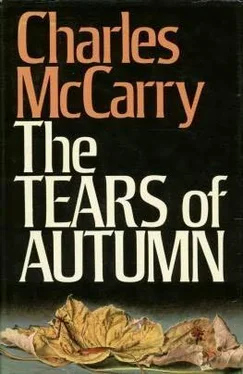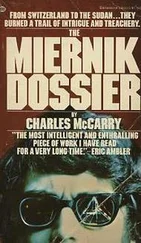Christopher looked at the green dial of his watch. “It’s two in the morning now,” he said. “I’ll make the deadline.”
In the darkness, Wolkowicz was chewing ice. “We’ll miss you, baby,” he said,
Luong lay in his coffin with a bunch of bananas on his chest to confuse the appetite of the Celestial Dog, devourer of the entrails of the dead. A ring of candles burned around the edge of the coffin, and an oil lamp smoked beneath it. A child of ten, Luong’s eldest son, stood at his father’s feet, welcoming mourners. He wore a straw headpiece and a robe of white gauze, covered with patches to show his wretchedness. Christopher bowed to the corpse and gave the child an envelope filled with piasters, two bottles of Veuve Cliquot, and a satin banderole on which was written a compliment to the dead man.
“I was your father’s friend,” Christopher said.
“Tho spoke about you,” the boy said. “I remember your visit.”
In death, Luong had been given another name, Tho, and no member of his family would call him by his own name again. Probably they had never done so when he was alive. A Vietnamese’s name is used only by officials and foreigners; those who know him call him by nicknames or a number that fixes his position in the family, so as not to provoke evil spirits.
Luong’s son placed Christopher’s gifts with the others on a low table beside the altar at the end of the coffin. No attempt had been made to conceal the bullet wound in Luong’s forehead; his relatives had put rice in his mouth, and a white grain of it was visible between his lips. In his best clothes, Luong looked not much older than his son. Luong had been dead for a full day, and the weeping had ceased; his wife, wearing patched gauze like her children, sat in a group of women with a white veil covering her face.
Musicians played at the end of the room, and male relatives with white mourning bands tied around their foreheads were drinking and laughing at jokes. They stared at Christopher, who stood alone by Luong’s coffin, and went on with their loud conversation. Luong’s widow made no sign that she saw him. When he turned away from the corpse, an old woman approached and gave him a bowl of food. He thanked her in Vietnamese and she bowed.
Christopher ate the food. Guests continued to arrive, crowding into the small house and filling it with a babble of voices and laughter. Luong’s picture of Christ with a burning heart had been brought out of the bedroom and hung beside a portrait of Buddha on the wall nearest the coffin.
A man detached himself from the group of male relatives and came toward Christopher with a cup of rice wine in either hand; he gave one of the cups to Christopher.
“You are my brother’s friend Crawford,” he said.
“Yes, I’m sorry for your family’s sadness,” Christopher replied.
“You speak Vietnamese.”
“Very badly,” Christopher said in French. “You are Tho’s brother? You look a great deal alike.”
“Yes, I am older by five years. My name is Phuoc.”
“I don’t want to intrude here. I only wished to pay my respects. I knew your brother well.”
“We thank you for the gifts you brought,” Phuoc said. “You knew he liked that sort of champagne. I told him often it would be his downfall.” Phuoc looked into Christopher’s face and gave an explosive high-pitched laugh. “The burial is tomorrow-will you come?”
“Alas, I’ll be gone tomorrow. But my thoughts will be here.”
Christopher finished his rice wine. Phuoc handed him his own cup. “Drink it,” he said. “I have no use for it. Perhaps Tho told you I am a cu si -not quite a monk and, my brother always said, not quite a man. I observe the five interdictions of Buddha: no sex, no alcohol, no tobacco, no theft, no killing.”
“Yes, he spoke about you. I believe he admired you very much.”
“Did he? Tho lived without interdictions of any kind, except that he never betrayed a friend.”
“That I have known for a long time,” Christopher said.
“How much money did you bring?” Phuoc asked. It was a polite question among Vietnamese, who were always asking each other the details of their salaries and bank accounts.
“There are 175,000 piasters in the envelope.”
“Very generous. In dollars or piasters?”
“In piasters-it’s an odd sum, but it equals five thousand dollars.”
“Piasters will be less embarrassing,” Phuoc said. “It will be a great help to his widow. She must stay indoors for two years, as you know. She worries about the children-Tho insisted on expensive schools.”
“He was right in that, of course.”
“He was right in most things. He put money away, I believe more than a million piasters. My brother expected to die young, he often told me so. His was not the sort of life that lasts very long in a country as troubled as ours.”
“He lived his life with courage, at any rate.”
Phuoc laughed again, opening his eyes and his mouth wide and letting shrill notes escape from his throat; it was a mannerism of grief.
“For your friendship and your money, you should have something in return,” Phuoc said. “Come with me for a moment.”
He led Christopher down the hall and into his dead brother’s bedroom. Closing the door behind them, he went to the window and looked out, then leaned his back against the wall. Incense burned on the dresser in front of a photograph of Luong.
“My brother was going to meet you when he died,” Phuoc said. “Did you know that?”
“Yes. I found his body.”
“Did he speak to you?”
“That doesn’t happen,” Christopher said. “He died instantaneously-you saw his wound.”
“Can you tell me anything more about his death?”
“I saw the men who killed him. They walked past me as I entered the street where he lay. I did not, of course, know then what had happened.”
“Would you know them again?”
“I saw them again. They shot at me.” Christopher gave Luong’s brother a description of the two men. “Both times they were in Cholon. I’d look for them, if I were looking, around
Dong Khanh Boulevard. They’ll have money to spend, and that’s where they’d go to spend it.”
Phuoc absorbed the information. “Have you any idea what my brother wished to tell you?”
“No. I asked him to find a person named Lê Thu. Before he went out for the last time, he told me he had one more source to question-nothing more than that.”
“Then he went to his death for you?”
“Yes,” Christopher said.
Phuoc did not laugh again. “My brother always did as he wanted to do. It wasn’t your fault. He thought highly of you. As it happens, I know where he went.”
Christopher waited. When Phuoc did not speak again, he said, “Would your brother have wished you to tell me?”
“Oh, I think so,” Phuoc said. “You paid, after all. He went to see a Chinese named Yu Lung. You know the name? Yu Lung is a respected astrologer and geomancer. He knows the stars and all the rest very well-it’s a gift as well as a science. Very expensive. Yu Lung serves the famous in secret, he won’t deal with ordinary men.”
“Thank you. Where is Yu Lung’s house?”
“In Cholon, near the Tat Canal, by the racetrack. Ask anyone. Yu’s house is poor outside, rich inside-he’s a Chinese.”
Christopher rose, hesitated, held out his hand. Phuoc gripped it tightly and, holding it for a long moment, threw back his head and laughed again. “Luong- Tho should have asked Yu Lung about his own future, eh? Instead of asking questions for you, Craww-ford. Do you know what the Vietnamese name Tho means?”
“Longevity.”
“Yes, my brother will be dead for a long time,” Phuoc said. “Tho is also the word for a coffin that’s purchased well in advance of death. We thank you again for the money.”
Читать дальше












